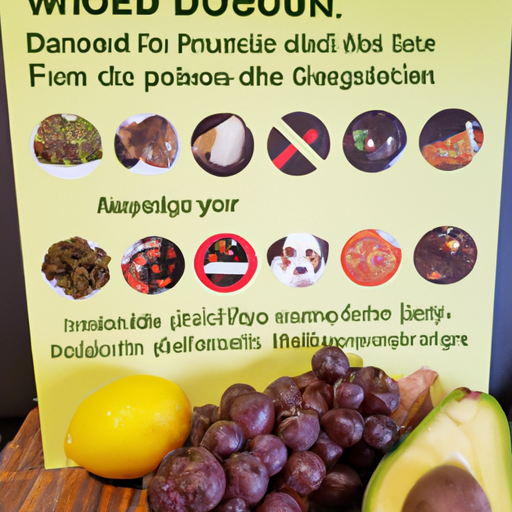As a caregiver for your four-legged friend, it’s important to know what foods are safe and which ones can pose a danger. In this article, we’ll be discussing eight food items that can harm your dog, along with frequently asked questions to help you gain a better understanding.
1. Chocolate
Chocolate is one of the most well-known dangers to dogs. It contains theobromine, a stimulant that dogs cannot metabolize as effectively as humans. The darker the chocolate, the more theobromine it contains.
- Mild symptoms: restlessness, excessive thirst, and a bloated stomach.
- Severe symptoms: abnormal heart rhythm, seizures, and in some cases, death.
Avoid giving your dog any type of chocolate. If you suspect your dog has ingested chocolate, contact your vet immediately.
2. Grapes and Raisins
Grapes and raisins have been found to cause kidney failure in dogs. Even a small amount can make a dog ill. Vomiting, lethargy, and depression are some symptoms to look out for.
3. Onions and Garlic
Onions, garlic, leeks, and chives can cause damage to a dog’s red blood cells, leading to anemia. Symptoms may not appear for several days, but include weakness, breathlessness, and a loss of interest in food.
4. Avocado
While the ripened fruit of the avocado is generally safe for dogs, the plant and pit are not. They contain a toxin called persin, which can cause vomiting and diarrhea.
5. Alcohol
Alcohol has a similar effect on a dog’s liver and brain that it has on humans. But it takes a lot less to harm them. Even a small amount can lead to toxicity.
6. Caffeine
Caffeine is extremely dangerous for dogs, and consumption can lead to serious health issues including muscle tremors, rapid breathing, and heart palpitations. This includes coffee, tea, and other caffeinated drinks.
7. Dairy Products
Dairy products can cause digestive problems in dogs due to lactose intolerance. This includes milk, cheese, ice cream, and yogurt. Symptoms include diarrhea, bloating, and gas.
8. Nuts
Most nuts, including almonds, pecans, and walnuts, contain high amounts of oils and fats. These fats can cause vomiting, diarrhea, and potentially pancreatitis in pets.
| Food | Danger | Symptoms |
|---|---|---|
| Chocolate | High | Restlessness, seizures |
| Grapes/Raisins | High | Vomiting, lethargy |
| Onions/Garlic | Medium | Weakness, breathlessness |
| Avocado | Low | Vomiting, diarrhea |
| Alcohol | High | Toxicity |
| Caffeine | High | Tremors, rapid breathing |
| Dairy | Low | Diarrhea, bloating |
| Nuts | Medium | Vomiting, diarrhea |
Frequently Asked Questions
1. What should I do if my dog eats something harmful?
If you suspect your dog has eaten something harmful, contact your vet immediately. They can provide guidance based on the food and the amount ingested.
2. Is it safe to feed my dog human food?
While some human foods are safe for dogs, it’s generally best to stick to dog food. Human food often contains ingredients and seasonings that can be harmful to dogs.
3. How can I prevent my dog from eating harmful foods?
Keep potentially harmful foods out of your dog’s reach, and never feed them food from the table. If you’re unsure whether a food is safe, always check with your vet.
4. Are there any safe alternatives to these harmful foods?
Yes, there are many dog-safe alternatives. For example, instead of grapes, you can give your dog pieces of apples (without the seeds). Instead of chocolate, try dog-specific treats.
Remember, you are the first line of defense in keeping your dog healthy. Being aware of harmful foods and keeping them out of your dog’s reach will help ensure they live a long, healthy life.



